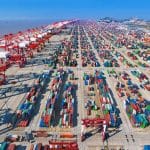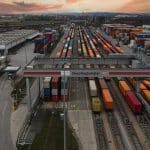NY-NJ PORT TO IMPOSE DWELL FEE TARGETING EMPTY CONTAINERS
The Port Authority of New York and New Jersey said it will start charging an export container dwell fee in a bid to prod ocean carriers to remove more containers than they drop off.
US TRUCKERS FLIP BACK INTO DRAYAGE AS LONG-HAUL SPOT RATES DIVE
Drivers are returning to port drayage as long-haul trucking rates slide and operating costs for small, independent motor carriers rise.
BNSF TAPS TACOMA FOR NEW MIDWEST INTERMODAL FREIGHT GATEWAY
BNSF has partnered with the Northwest Seaport Alliance to open a new intermodal rail yard near the Port of Tacoma that will serve cargo destined for US Midwest markets.
SHIPPERS, TRUCKERS PLEAD FOR FMC PER DIEM RELIEF AMID NY-NJ EMPTY BOX BACKLOG
Shippers and motor carriers are urging the Federal Maritime Commission to address the growing problem of returning empty containers to New York and New Jersey marine terminals.
COAST GUARD INVESTIGATING LASER STRIKES ON LAKE ONTARIO SEARCH AND RESCUE BOATS
The U.S. Coast Guard and local law enforcement are investigating two recent laser strike incidents against two USCG small boats participating in search and rescue operations in Lake Ontario. The incidents took place June 11 and July 12. The Coast Guard said the first incident originated from Moon Beach, New York and the second from nearby Oswego. Attempts to locate the suspects remain ongoing. In both cases, high-powered laser illuminated the small boats numerous times, striking the crew in the eyes. No injuries were sustained, but the Coast Guard warns that these types of actions are illegal and can cause severe effects to its safety and missions, not to mention eye injury. “In every instance that a U.S. Coast Guard small boat is observed on the water, they are either performing a mission, training, or transiting. As with all emergency responders, the work they do is in the best interests of the public. When struck by a laser, they cannot perform their job, and may in fact have suffered eye injuries.” Coast Guard Investigative Service Special Agents are working with local law enforcement to investigate the recent incidents.
WILL SHIPS OVERLOAD CALIFORNIA WAREHOUSES?
America’s largest warehouse market is full as major U.S. retailers warn of slowing sales of the clothing, electronics, furniture and other goods that have packed the distribution centres east of Los Angeles. The merchandise keeps flooding in from across the Pacific, and for one of the busiest U.S. warehouse complexes, things are about to get worse. Experts have warned the U.S. supply chain would get hit by the “bullwhip effect” if companies panic-ordered goods to keep shelves full and got caught out by a downturn in demand while shipments were still arriving from Asia. In the largest U.S. warehouse and distribution market – stretching east from Los Angeles to the area known as the “Inland Empire” – that moment appears to have arrived. The sprawl of Inland Empire warehouses centered in Riverside and San Bernardino counties grew quickly in recent years to handle surging demand and goods imported from Asia. That booming area, visible from space, anchors an industrial corridor encompassing 1.6 billion square feet of storage space that extends from the busiest U.S. seaport in Los Angeles to near the Arizona and Nevada borders. That much storage space is nearly 44 times larger than New York City’s Central Park and 160 times bigger than Tesla Inc’s $TSLA new Gigafactory in Texas. But a consumer spending pullback now threatens to swamp warehouses here and around the country with more goods than they can handle – worsening supply-chain snarls that have stoked inflation. Retailers left holding unwanted goods are faced with the choice of paying more money to store them or denting profits by selling them at discount.
GREAT LAKES’ FIRST NEW US-FLAGGED BULK CARRIER IN 40 YEARS SETS SAIL ON MAIDEN VOYAGE
The first new U.S.-flagged Great Lakes bulk carrier built in nearly 40 years departed on its maiden voyage from Fancantieri Bay Shipbuilding in Sturgeon Bay, Wisconsin. Measuring 639 feet in length 28,000 DWT, the ship will transport raw materials such as salt, iron ore, and stone to support manufacturing throughout the Great Lakes region.




